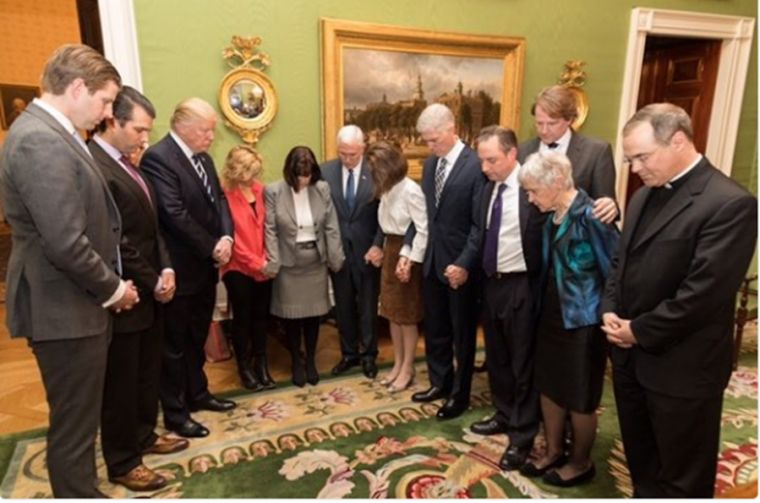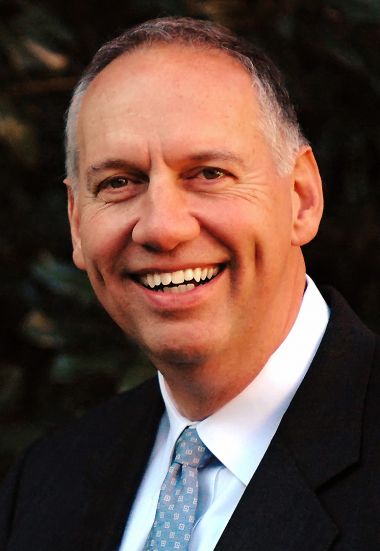Influence, unprecedented access and an 'impact on policy': Are evangelicals tightening their grip on Trump's White House?

Richard Land, the predecessor to Russell Moore as head of the Southern Baptist Convention's Ethics & Religious Liberty Commission, confirmed liberals' worst fears this week when he said that the so-called religious right has gained 'unprecedented access' to the White House under Donald Trump's presidency, and is having an 'impact on policy'.
Land, who was among the evangelical leaders who famously prayed with Trump in the Oval Office on July 10, stepped up his claims of influence after saying in January that he had been asked for 'personnel recommendations' by the Trump administration.
Interviewed by Ronnie Floyd, the former SBC president, on the Family Research Council's Washington Watch programme, Land said that Trump had been 'a very pleasant surprise to me'.
Land said he and other evangelical leaders including Tony Perkins, Gary Bauer and Ralph Reed 'all testified to the fact that we've never had the kind of open access to the administration that we've had in this administration'.
He continued: 'And it is sort of nice when you walk around the halls of the Eisenhower Executive Office Building to keep running into people you know who are evangelicals. Personnel is policy. And there are more evangelicals in this administration as personnel than any administration in my lifetime...And, you know, it's a lot easier to explain evangelical concerns to evangelicals.'
Land added: 'Not only do we have access, but we have had impact on decisions. We have had impact on policy. And it's a whole different atmosphere, there really is, there's a different atmosphere in the White House and the administration.'
He went on to say that Trump is 'absolutely fascinated by evangelicals' and 'finds us to be in sync with him on a lot of things'.
As well he might, given the well-known statistic that around 81 per cent of whote evangelicals voted for Trump in last November's presidential election.
Land's comments came as Christian Today reported yesterday that Trump's White House last week expanded its engagement with faith leaders by holding three different 'listening sessions' featuring nearly 100 different Christian leaders and activists.
Just weeks after the gathering of around 30 evangelical leaders met for an all-day session in Washington, the White House Office of Public Liaison expanded its evangelical outreach by inviting faith leaders who have not yet been involved in previous meetings with the administration to voice their concerns, according to the Christian Post (CP).
The prominent evangelical Johnnie Moore, who serves as an informal adviser to the White House, told CP that he attended all three meetings held at the Eisenhower Executive Office Building in Washington.
'The White House has continued to have listening sessions with evangelical leaders and they had three more this week. Almost 100 evangelicals [participated],' said Moore, who heads a public relations company that gives voice to many notable evangelical pastors. 'Each listening session was about two hours and involved briefings from administration officials and an opportunity for folks to express their thoughts on various issues.'
Meanwhile, according to the Christian Broadcasting Network (CBN), several of President Donald Trump's key Cabinet officials meet regularly for Bible study in the White House – a development described as 'troubling' by one observer.

Critics point to the man leading the meetings, Ralph Drollinger, an evangelical minister with a history of controversial statements, including on homosexuality, who is the founder of the evangelical group Capitol Ministries, which pursues the goal of spreading the gospel to public servants.
Maggie Garrett, the legislative director of Americans United for Separation of Church and State, yesterday told mic.com: 'This one pastor is given what appears to be unprecedented access by the White House to top Cabinet leaders on a weekly basis.'
It is even more troubling, Garrett said, 'when you consider [that] this pastor has called Catholicism a false religion, said women who work after having children are sinners and said homosexuality is an abomination'.
In 2004, Drollinger suggested that female lawmakers who have young children at home are sinners. According to the Los Angeles Times, he wrote in a Bible lesson: 'It is one thing for a mother to work out of her home while her children are in school. It is quite another matter to have children in the home and live away in Sacramento for four days a week. Whereas the former could be in keeping with the spirit of Proverbs 31, the latter is sinful.'
The Los Angeles Times reported that this came just a few months after Drollinger referred to Catholicism as 'one of the primary false religions of the world'.
During an interview with Sacramento News and Review in 2005, Drollinger said that 'Homosexuality is a sin' and an 'abomination in the eyes of God'.
According to the CBN report, Cabinet members including the Education Secretary Betsy DeVos, Energy Secretary Rick Perry and Health and Human Services Secretary Tom Price, have been attending weekly bible studies led by Drollinger.
The Attorney General Jeff Sessions and the Vice President Mike Pence have also reportedly attended the meetings, which Drollinger told CBN was 'the best Bible study that I've ever taught in my life'.
Ira Lupu, a professor emeritus of law at George Washington University Law School and an expert in constitutional law, told mic.com: 'The appearance of Bible study in the White House shows a kind of symbolic alliance between a particular faith and the government, and that makes people uneasy'.
But, he added: 'I wouldn't find it bothersome unless it was exclusive or coercive...There's a difference between tension and some violation of a constitutional norm.'
Georgetown associate professor of law Martin Lederman appeared to agree, saying that 'the principal legal concerns, if any, would be only if there were some pressure to attend ... [or] if other religions and secular groups were not permitted to have analogous study sessions'.
Nonetheless, Garrett pointed out: 'The president and his Cabinet serve all of us. Knowing they attend Bible studies like this sows doubt in our minds about whether they do. Our government's policies should be inclusive and promote fairness and equality, not be implemented based on a narrow religious agenda.'
And that is not to mention Trump's vocal support from other controversial figures, such as Jerry Falwell Jr, the current president of Liberty University who has railed against homosexuality and who supported apartheid in South Africa.
However controversial the relationship is between Trump's White House and the evangelicals, however, what appears clear is that it will, if anything, get closer.
Moore told the CP that in due course, there 'will be more' such meetings between administration officials and the faith leaders.
'What I understand is they intend on inviting lots and lots and lots of leaders to listening sessions among various constituencies,' he said. 'There will be more of them. They want this to be people's house and they want to make sure there is no problem getting in touch with them and expressing points of view and those points of view are taken into account.'
Floyd concurred, saying that there will be 'deeper engagement' between the White House and faith leaders.
'Regardless of what people say...there are two things we need to be encouraged [about],' he said. 'First, this administration has proven that they care about what people of faith want and what people of faith are concerned about and they are addressing them. It is very obvious that they are addressing them. Secondly, this administration ... is zealous for people to pray for them. Obviously, they need it and we all need it in our country and they are very willing to pursue God about matters in this relationship and asking people to pray for them.'











